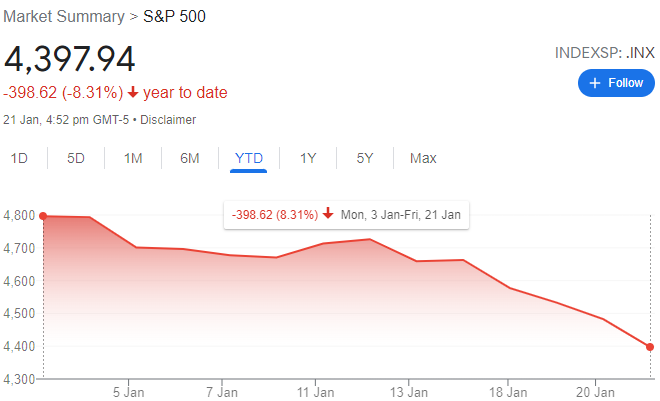In the start of the year of 2022, the stock market seem to be taking a dip. In fact, as I am writing this the S&P 500 fell by 8.31%.

Many times, people like to ask this question - Why is the stock market falling?
To be honest, nobody can actually give you a definite answer.
But I can tell you one of the worst answer anyone can give.
"It is because there are more sellers than buyers."
This is the most ridiculous answer.
The reason is simple.
In every transaction, there is one buyer and one seller. So how is it possible that there is more buyers than sellers? This means the number of buyers and sellers should be exactly the same!
But this brings us to an important point.
Are You A Buyer or Seller?
Now, we know that a transaction is between a buyer and a seller. You need to ask yourself this.
When the stock market is falling, who exactly is buying all these beaten down stocks?
People like me and my students - steady long term investors, who know that by investing in fundamentally good companies, we are bound to make money in the long run.
Notice that I always mention "long run".
This is because the stock market is a long term game. Whenever, I buy a stock - I buy it as with the mindset of an investor, not a trader.
Yes - this means, I am buying stocks from all those people who are panicking and selling all these great companies at silly prices.
This is why having your very own profitable watchlist is so damn important. This watchlist is essentially a list of great companies and its calculated valuation. As a matter of fact, I share my very own watchlist with my students which I update every single month.
Why is this watchlist so powerful?
Because, whenever the stock market takes a dip - I open my watchlist and at a glance, I am able to quickly tell what are my opportunities. I then simply buy and hold these undervalued companies.
You need to understand this concept.
Money is not made in bull markets, but rather it is made because of the actions we took BEFORE the bull market happens.
If you want to be a great investor, you need to take a different approach from the majority. If most people are panicking and selling, guess what - this could be the best opportunity for you to become a buyer.
What If I Don't Have Money To Buy
One of the advantage that I have as a 9-to-5 is the stability of a monthly paycheck. This allows me to always transfer money out from bank account into my brokerage account on a monthly basis.
For those who have watched my webinar for 2022, you will realised the concept of the Black Box. And once you have figured your Black Box out, you will never want to leave money in the bank again. I will say this - it is silly to leave a surplus amount of money in the bank.
But sure - If I indeed do not have any surplus money to buy stocks (unless my next paycheck comes), then I will simply hold my stocks, and even sell call options on them.
Selling call options helps to bring in more cash flow, and when cumulated over time, allows me to buy even more shares.
This is why I only buy stocks that are optionable, allowing me to use options to create more cash flow, to buy more stocks.
For more advanced people
When I learnt from many entrepreneurs, there is one thing in common which I realised.
They are RESOURCEFUL.
They understand that if life do not give you resources, then you have no choice but to become resourceful instead.
Here's an example I would give:
- Alex gives Billy $200.
- Billy gives Charlie $200.
- Charlie gives Alex $200.
Who actually makes money? Alex, Billy or Charlie?
Well - the simple answer is nobody.
However, things can change once I add this.
- Alex gives Billy $200 on 1 Jan 22
- Billy gives Charlie $200 on 1 Jan 23
- Charlie gives Alex $200 on 1 Jan 24
- The cycle repeats every year
Now, each of them have 1 year in between the receiving and giving of money. Why is this any different?
Well, when Billy receives the $200 from Alex on 1 Jan 22 - he could use the $200 and compound it for 1 year, he perhaps could make $300. He then gives $200 to Charlie. This means he profited $100.
Similarly when Charlie receives the $200 from Billy, he also could compound the $200 for another 1 year and makes maybe $400 - he then gives Alex the $200.
The cycle the continues.
Can you see that in this case, there is actually a possibility of all of them making money? Provided they invested in quality stocks (like me and my students) and use options wisely.
So why am I saying this?
It is because I did the exact same thing - except that I did it by selling long term put options.
(Make sure you have good options knowledge before you read on)
You see when I sell a put option at $50, I am expected to have kept $5,000 aside so that I can promise to buy $5,000 worth of shares if the option gets exercised.
Now, the put options are usually only exercised at the end of expiry if the share price is below the strike price. This means that I do not actually need to pay this $5,000 until the end of expiry.
Now think about it closer, when I sell a put option at $50 with a two years expiry, I will likely collect around $150 of option premium. I can then use the option premium to buy stocks.
This is how I take advantage of "lag time" to create cash flow to pay for my shares especially when they are at a deep discount.
In fact, this is actually what I did:
- I sell a put option at $500 at a one year expiry and collected $5,000.
- This means I promise to buy $50,000 worth of shares
- I should have at least this amount of cash in one year time (which I know I will have)
- I use the $5,000 to buy shares of a undervalued company
- When the share price goes up over the long term (typical for fundamentally good companies)
- After one year, my sell put expires worthless.
- I do not have to buy $50,000 worth of shares.
- I make money from the $5,000 worth of shares I bought one year ago
This was actually inspired by one of the entrepreneurs that I learned from - that is to really learn how to manipulate time and create cash flow from the future. If your stock fundamentals are strong, you will find that this is an insane strategy and you will always find ways to create cash flow for investments.
However, I emphasize this - if your fundamentals in stocks is not strong - then forget about this strategy.
The Bottom Line
It does not really worry me whether the stock market is falling. Why should I care if the stock market is falling, if I am an investor with a long term outlook?
All I had to do was to find cash flow to invest and subsequently hold all these great quality companies. Investing does not have to be that complicated. What is most important is that we understand the fundamentals of our companies well.
If you like to find out more about how I find qualified companies to invest in, then check out my webinar that I recorded previously.

The "Qualified Stocks" Training
What an engineer did to grow his portfolio from $7,137.68 to $194,383.30 in just 4 years using qualified stocks...so that WORKING AT A JOB was A CHOICE AND NOT A necessity...
